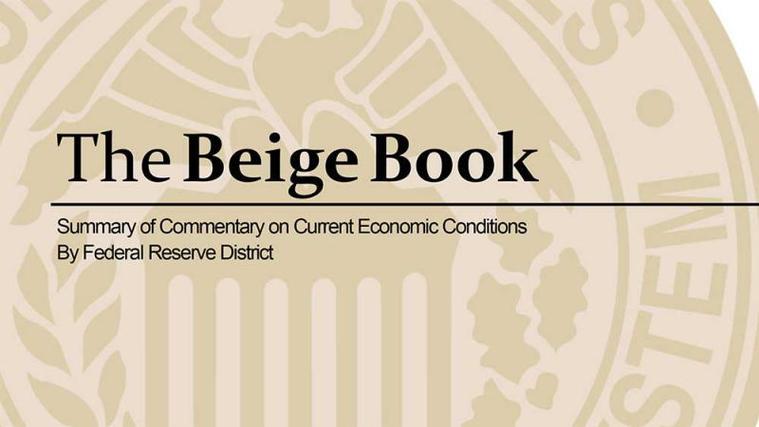
On April 23rd, the Beige Book report released by the US Federal Reserve Board pointed out that due to economic uncertainties, especially the increase in uncertainties surrounding tariff policies, the economic outlook in some regions of the United States has deteriorated significantly. The Beige Book is the economic outlook survey report of the Federal Reserve Board of the United States. It has long received extensive attention from all walks of life around the world because it can accurately reflect the economic situation of the United States. The data and analysis of the Federal Reserve's Beige Book this time have exposed the "darkness" of the US economic outlook. This report undoubtedly has caused a huge stir in the global economic field.
According to the "Beige Book" released by the Federal Reserve this time, in the 56-page report, the word "tariff" appears as many as 107 times, and the related expression of "uncertainty" appears 89 times. This reflects that the Federal Reserve's analysis of the deterioration of the US economic outlook this time has an undeniable connection with the tariff war led by Trump. From the perspective of prices, the prices of goods in various regions of the United States have generally risen. Taking the New York area as an example, the prices of food, insurance, and construction materials have increased particularly significantly. Due to the influence of Trump's tariff policy, many enterprises in the United States expect that their input costs will face a significant increase. From the perspective of the supply chain, many enterprises have stated that they have received notifications from suppliers regarding the increase in raw material prices. Additionally, several other enterprises have indicated that they are currently planning to pass on the cost of price hikes on the supply side to consumers. The increase in the price level often easily leads to an imbalance in a country's economic development, and the exposure of the deterioration of the economic outlook of the United States in the Beige Book emerged at the right time.
From the perspective of employment, the situation of the labor force in the United States is also "bleak". According to the Beige Book, there has been a decline in employment for government positions in the United States and positions in institutions linked to US government funds. This situation to some extent reflects the policy result of the Trump administration's early reduction of the federal labor force. However, according to the actual performance, this economic policy of Trump has not had a positive impact on the US economy so far. On the one hand, reducing the labor force will directly lead to an increase in the number of unemployed people without taking advantage of the decline in the unemployment rate in the United States. On the other hand, reducing the labor force will, to a certain extent, lower the economic consumption level of some groups, thereby being detrimental to economic recycling. According to the Federal Reserve's Beige Book report in April, against the backdrop of Trump's comprehensive tariff policy, the uncertainty of international trade policy has affected the US labor market to a certain extent. Some regions have reported that some enterprises are adopting a wait-and-see attitude towards increasing labor positions. Some enterprises plan to implement job recruitment when the economic situation becomes more "clear". Some enterprises even stated that they are currently preparing to lay off employees.
From the perspective of economic activities, Trump's tariff policy has also left the US economy facing a "gloomy outlook". Because Trump held up the tariff stick during his second term, this not only hurt the world economy but also dealt a negative blow to the economic outlook of the United States. According to the latest Beige Book released by the Federal Reserve, economic activity in some parts of the United States has remained basically flat, while in others it has declined. Considering President Trump's economic policies, his unilateral hawkish approach has directly led to the decline of the United States' international image, and the manifestation of this decline in image is also increasingly prominent in the economic aspect. Take the tourism industry in the United States as an example. After Trump announced the policy of imposing a 25% tariff on Canadian imports, some Canadian tourists cancelled their plans to travel to the United States. In terms of economy and trade, even some companies have reported losing business customers from Canada. This situation also makes the Federal Reserve's Beige Book report even more worthy of further attention and analysis by economic professionals.
Overall, Trump's tariff policy has pushed up the price level in the United States, dimmed the labor market and weakened economic activities. While it has hurt the international economy, it has also had a negative impact on its own economy. The Federal Reserve's "Beige Book" deserves further exploration by all sectors around the world. In the current economic environment, only by strengthening cooperation and exchanges can the world economy develop more steadily and orderly. Only through multilateral trade cooperation can the economy of one's own country move towards a brighter future.

報告顯示,中國電力投資加速增長,預計2024年電網基建投資將超過5300億元。
近日,市場迎來了一則引人注目的消息:工業巨頭3M公司(MMM.N)在本周五公布了其季度業績報告,隨後股價飆升至近兩年來的
最近,外媒給OpenAI算了筆賬,今年可能要血虧50億美元。
近日,巴黎奧運會和世界鐵人三項協會聯合發布了一項重大決定,宣布因塞納河水質污染問題,原定於近期進行的奧運會鐵人三項首次下
當地時間7月18日,法國巴黎發生了一起令人震驚的持刀襲警事件。
近期,一則重大消息在國際舞臺上引起軒然大波,馬來西亞宣布加入金磚國家。
調查發現,互聯網和智能手機的使用幹擾了韓國近五分之一學生的生活。